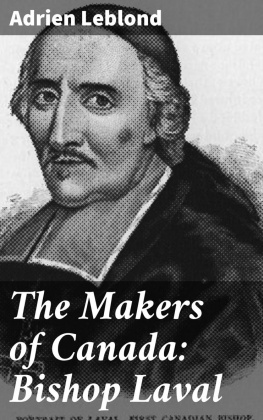INTRODUCTION
Table of Contents
In undertaking to write a biography of Samuel Champlain, the founder of Quebec and the father of New France, our only design is to make somewhat better known the dominant characteristics of the life and achievements of a man whose memory is becoming more cherished as the years roll on.
Every one will admire Champlain's disinterested actions, his courage, his loyalty, his charity, and all those noble and magnificent qualities which are rarely found united in one individual in so prominent a degree. We cannot overpraise that self-abnegation which enabled him to bear without complaint the ingratitude of many of his interpreters, and the servants of the merchants; nor can we overlook, either, the charity which he exercised towards the aborigines and new settlers; the protection which he afforded them under trying circumstances, or his zeal in promoting the honour and glory of God, and his respect for the Rcollet and Jesuit fathers who honoured him with their cordial friendship. His wisdom is evidenced in such a practical fact as his choice of Quebec as the capital of New France, despite the rival claims of Montreal and Three Rivers, and his numerous writings reveal him to us as a keen and sagacious observer, a man of science and a skilful and intrepid mariner. As a cosmographer, Champlain added yet another laurel to his crown, for he excelled all his predecessors, both by the ample volume of his descriptions and by the logical arrangement of the geographical data which he supplied. The impetus which he gave to cartographical science can scarcely be overestimated.
Naturalist, mariner, geographer, such was Samuel Champlain, and to a degree remarkable for the age in which he lived. It is, perhaps, unnecessary to dwell upon the morality of the virtuous founder. The testimony of the Hurons, who, twenty years after his death, still pointed to the life of Champlain as a model of all Christian virtues, is sufficient, and it is certain that no governor under the old rgime presented a more brilliant example of faith, piety, uprightness, or soundness of judgment. A brief outline of the character of Champlain has been given in order that the plan of this biography may be better understood. Let us now glance at his career more in detail.
Before becoming the founder of colonies, Champlain entered the French army, where he devoted himself to the religion of his ancestors. This was the first important step in his long and eventful career. A martial life, however, does not appear to have held out the same inducements as that of a mariner. An opportunity was presented which enabled him to gratify his tastes, when the Spanish government sent out an armada to encounter the English in the Gulf of Mexico. Champlain was given the command of a ship in this expedition, but his experience during the war served rather as an occasion to develop his genius as a mariner and cosmographer, than to add to his renown as a warrior.
God, who in His providence disposes of the lives of men according to His divine wisdom, directed the steps of Champlain towards the shores of the future New France. If the mother country had not completely forgotten this land of ours, discovered by one of her greatest captains, she had, at least, neglected it. The honour of bringing the king's attention to this vast country, which was French by the right of discovery, was reserved for the modest son of Brouage.
While Pierre du Gua, Sieur de Monts, was wasting his years and expending large sums of money in his fruitless efforts to colonize the island of Ste. Croix and Port Royal, Champlain's voyage to Acadia and his discovery of the New England coast were practically useful, and in consequence Champlain endeavoured to assure de Monts that his own efforts would be more advantageously directed to the shores of the St. Lawrence, for here it was obvious that the development of the country must commence.
Champlain's next step was to found Quebec. With this act began our colonial history, the foundation of a Canadian people with its long line of heroic characters distinguished by their simplicity and by their adherence to the faith of their fathers. Quebec was founded, but nothing more was accomplished at the moment owing to the lack of means. The trials of Champlain now commenced. Day by day he had to contend against his own countrymen. The attractions of fur trading were too great for the merchants to induce them to settle down and develop the country around them, and they were unwilling to fulfil their promises or to act in accordance with the terms of their patents.
During the next twenty years Champlain crossed the ocean eighteen times. Each voyage was made in the interest of the colony, and he sought by every means in his power, by prayers and petitions, to obtain the control of the commerce of the country so as to make it beneficial to all. In spite of his extraordinary exertions and the force of his will, he foresaw the fatal issue of his labours.
The settlers were few in number, bread and provisions were scarce, and the condition of the infant colony was truly deplorable. At this distressing period a British fleet arrived in the harbour of Quebec. What was to be done? The rude fortress of St. Louis could not withstand the assault of an armed fleet, even if it were well defended. But Champlain had no ammunition, and he, therefore, adopted the only course open to him of capitulating and handing over the keys of the fort to the commander, Kirke. Champlain then left Quebec and returned to France. Bitter was this journey to him, for it was like passing into exile to see the familiar heights of Quebec fade into the distance, the city of his foundation and the country of his adoption.
We have an idea of his sorrow during the three years that England maintained supremacy in Canada, for he says that the days were as long as months. During his enforced sojourn in France, Champlain exerted all his energies to revive interest in the abandoned colony. His plan was to recover the country by all means. Finally success crowned his efforts, and the treaty of St. Germain-en-Laye gave back to France the young settlement. Champlain recrossed the sea and planted the lily banner of France upon the heights of Cape Diamond.
In the year 1635 Champlain was taken ill, and died on Christmas Day, after having devoted forty years of his life to the promotion of the religion and commercial interests of the land of his ancestors, but he bequeathed to the Canadian people the priceless heritage of Quebec, and the memory of a pure and honest heart.
Before Champlain's death, however, Quebec had commenced to develop. On the Beauport coast might be seen the residences of many of the settlers who arrived from the province of Perche in 1634. On the shores of the river Lairet, the Jesuits had built a convent, where the young Indians received instruction; and agriculture had received some attention. Robert Giffard had established a colony at Beauport which formed the nucleus of a population in this section of the country. Near Fort St. Louis the steeple of Notre Dame de la Recouvrance gave witness that Champlain had fulfilled his promise to build a church at Quebec if the country was restored to her ancient masters.








